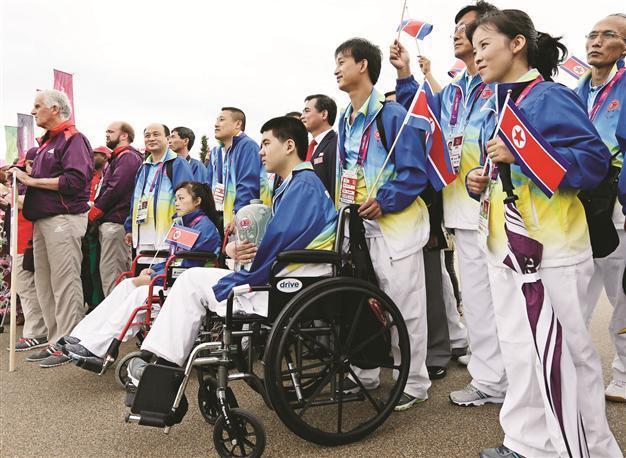Paralympic swimmer to inspire N Korean people
PYONGYANG, North Korea - The Associated Press

Rim Ju Song (C) sits in a wheelchair during the team’s welcome ceremony in London. AP photo
North Korea, long accused of shunting its disabled residents off to isolated detention camps, will take part for the first time this year in the Paralympics, which open today in London.The country’s sole competitor is a 16-year-old swimmer whose training only began in April. Yet North Korea’s participation offers inspiration to others involved in North Korea’s disabled sports programs, says Li Pun Hui, a former table tennis star who has become her country’s leading advocate for disabled athletes.
“Healthy or disabled, if you have the will to succeed, there is no obstacle in your way,” Li said.
Earlier this year, Li’s work helped gain North Korea provisional membership in the International Paralympic Committee. But the clearance to participate came too late to qualify for most events. The exception was swimming. Rim, who actually lives in Beijing and lost an arm and leg in a construction accident, became his country’s only hope. The problem: He couldn’t really swim.
The first training session was a disaster. He sank “like a rock,” recalled Kim Sung Chol of the North Korean Paralympic Committee. Nevertheless, he soon learned the crawl stroke and in May, Rim and his coaches boarded a plane for Berlin and his first international competition.
Rim was given a wild card slot in the Paralympics, where on Sept. 4 he’ll compete in the 50m freestyle.
North Korean athletes who win medals at international tournaments are welcomed home as heroes.
One of those heroes was Li, who became her country’s darling after teaming up with a South Korean player in 1991 to beat the seemingly indomitable Chinese and win the team gold at the World Table Tennis Championships. It was the first time players from the enemy Koreas competed together.
Sporting hero
After her career ended and her now-15-year-old son was born with cerebral palsy, Li dedicated her life to bringing the disabled out of the shadows and onto the playing fields. In 2010, she organized a table tennis tournament that was covered by state media - the first time many North Koreans saw the disabled on TV.
“Caring for my son, I’ve felt that people with disabilities often feel despair,” she told The Associated Press in an interview in Pyongyang. “They feel uncomfortable around other people, ashamed of their disabilities, and purposeless.”
This may be especially true in North Korea. The country has some 1.8 million disabled people, about 7.5 percent of the population, according to the Green Tree Charity Foundation in South Korea, which bases its estimate on figures provided by the North Korean government.
“People can communicate through sports,” she said, “and learn to feel comfortable around one another through sports.”
















